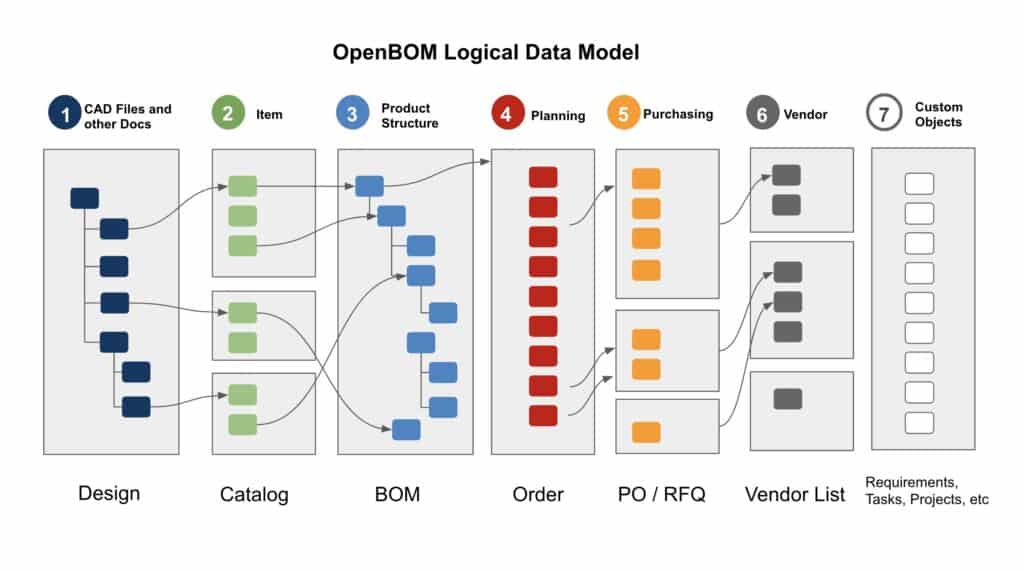
In a world where manufacturing businesses are becoming increasingly global and complex, it is essential to have a data and processes management foundation that is flexible enough to easily adapt to changing requirements.
When we started OpenBOM, we realized that one of the key elements of the platform is the capability to be flexible and configurable to adjust to various customer requirements and business processes. Our very first observation was that the flexibility of spreadsheet-based solutions makes companies adopt them easily and fast. The same goes pretty much for all capabilities of the data management OpenBOM platform – from configuration options to customizations tailored to their specific needs. OpenBOM offers tools that enable quick setup of custom configurations within its innovative digital-thread platform.
In this blog post, I want to summarize some of the existing capabilities of OpenBOM and give you a heads up on what we are building now at OpenBOM that will soon become available to you.
PLM Flexibility is Key to Customer Adoption
Product Lifecycle Management (PLM) is a complex process that involves managing and coordinating the various stages of a product’s lifecycle, from concept and design to production and retirement. Flexibility is key for PLM because it allows organizations to easily adapt to changes in product designs, production processes, and regulatory requirements.
A flexible PLM system can accommodate changes in product designs and specifications, allowing organizations to respond quickly to customer needs and market trends. Flexibility also enables better collaboration among different departments and stakeholders, such as engineering, manufacturing, and supply chain management, improving overall efficiency and productivity.
Flexibility in PLM also allows for scalability, meaning that the PLM system can grow and evolve as the organization does. Additionally, flexibility in PLM allows for better data governance, including data security and compliance with industry regulations. It also helps to have better control of the product data, which can be reused, shared, and tracked through the product life cycle.
Data management is a key element of PLM and, therefore, the flexibility of data management is the key element of PLM flexibility. Flexibility in data management is important because it allows organizations to easily adapt to changing business needs and requirements. This can include changes in data types, data sources, and reporting requirements. Flexible data management systems can easily accommodate these changes without requiring significant restructuring or modification. Additionally, flexibility enables better collaboration and information sharing among different departments and stakeholders, improving overall efficiency and productivity. It also allows for scalability, meaning that the data management system can grow and evolve as the organization does. Additionally, flexibility in data management allows for better data governance, including data security and compliance with industry regulations.
OpenBOM Flexibility
At the core of OpenBOM is a set of flexible capabilities allowing customers to manage information, share data and orchestrate processes. Start learning about OpenBOM flexibility from this article – 5 Dimensions of OpenBOM flexibility.
- Account
- Data Model
- Data Sharing and Collaboration
- Revision and Change Management
- Open API
One of the key elements of OpenBOM flexibility is data management flexibility, which is represented by allowing the creation, capture, and management of any data elements. Check out OpenBOM flexible data model article.
Heads up – Custom Objects Types, Custom Commands, and Events
At the core, OpenBOM allows the management of 6 main business objects – Files, Items, Catalogs, BOM, Orders, Vendors, and Purchase orders. You can see them here.

In fact, the core architecture of OpenBOM is providing more flexibility, and in our 2023 roadmap, we announced that we will be bringing even more flexibility to the OpenBOM platform. Here are three essential elements of flexibility and configuration that will be coming soon to OpenBOM to allow you to provide an even more rich set of functions.
Custom Object Types and Reference To Object Relationships
A very important new capability of OpenBOM is to define any custom object type In addition to already predefined business objects, the customers will be able to build a more flexible data management schema. Today OpenBOM allows you to build different item types (using multiple catalogs). We are going to bring more. Think about custom data such as Projects, Tasks, Requirements, Suppliers, Manufacturers, and many others. Combined with a custom object, we bring a way to create links (networks) of dependencies between objects. It will become a powerful architectural element of OpenBOM to create any type of information. The core infrastructure of OpenBOM does it already and we are going to expose it to the customers as part of the OpenBOM digital thread platform
vision.
Custom Commands
Creating a custom user behavior is important. Therefore, OpenBOM is bringing a new type of command (scripts) that allows it to run custom function execution and call any REST API services. It will be part of our vision to allow customers to communicate with other software and services.
Webhook Events
It is very important to build event-driven data integration processes. OpenBOM will be enhancing our public APIs with the capabilities to create events and subscribe to event webhooks.
Conclusion:
At OpenBOM, we focus on how to develop the most flexible digital thread platform capable to manage a rich set of product information and connect OpenBOM users and processes to external data sources, applications and companies. By extending OpenBOM data management capabilities and introducing new custom commands and events, we will be extending the horizons of OpenBOM implementations in a diverse set of engineering and manufacturing software.
Are you looking for a flexible platform to manage the digital foundation of your manufacturing company? Check out OpenBOM’s 14 Day trial, REGISTER FOR FREE, and see how OpenBOM can help you and your team today!
Best, Oleg
Join our newsletter to receive a weekly portion of news, articles, and tips about OpenBOM and our community.










